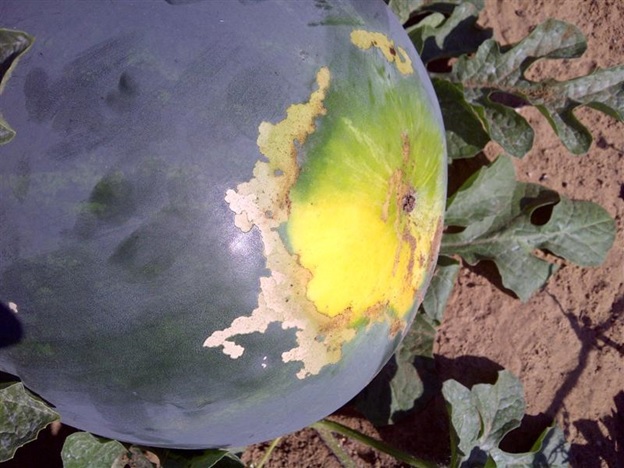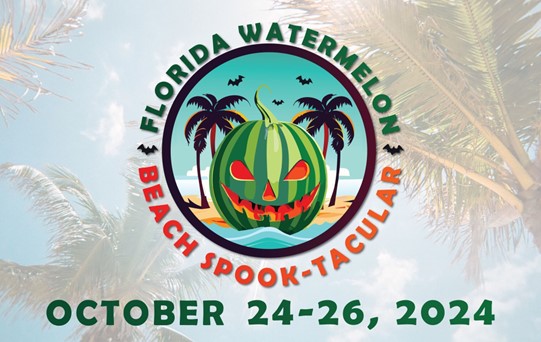Welcome to this week’s issue of our 2024 season UF/IFAS Extension Suwannee Valley Watermelon Crop Update. These updates will be summarized by Bob Hochmuth, Regional Specialized Extension Agent- Vegetable Crops, with input from Suwannee Valley Extension Agents: Mark Warren (Levy), Tyler Pittman (Gilchrist), Tatiana Sanchez (Alachua), Luke Harlow (Bradford), Dan Fenneman (Madison), Keith Wynn (Hamilton), Emily Beach (Lafayette), Jim Devalerio (Union), De’Anthony Price (Jefferson), Raymond Balaguer(Suwannee), Kevin Athearn (RSA-Agri- business), Shivendra Kumar (RSA-Agronomic Crops), Jay Capasso (RSA- Water Resources), and Bob H. covering vacant Columbia County position.
Rindworm 101
We have not received reports of damage from rindworms yet, but keep a close eye on any feeding damage and let us know if you see any early feeding symptoms. The term “rindworm” actually refers to a group of several caterpillar species including but not limited to, corn earworm, fall armyworm and beet armyworm, not just one species. We expect increased rindworm feeding in the next few weeks, therefore, continue to scout for damage and spray weekly as needed. Management strategies are complicated due to new label restrictions to protect pollinators (that is a good thing). Once you begin to see frequent symptoms of damage, the better materials will include the higher labeled rates Intrepid or Coragen (as sprays only) which are also safe to pollinators. Coragen is not very effective as a chemigated option once fruit are large and worms are feeding, because even though systemic, Coragen is not translocated well to the rind of large fruit. Please, do not use pyrethroids (bifenthrin, Asana, Lambda, etc.) for control of rindworms as there is a very high level of resistance to that class, they are very toxic to bees, and are very harsh on beneficials and often result in a spider mite outbreak as a result. I can only say, it is much easier to prevent rindworms than to clean them up once they start.
Pollinator safety. Our UF/IFAS Vegetable Production handbook has almost 4 pages of labeled insecticides for worm management in watermelon. Below, I want to focus on the main summaries you need to consider. First, most of the insecticides labeled in those pages fall into the pyrethroid group 3A, all of which are very toxic to bees. Old standbys like Lannate are also very toxic to bees. Radiant is another excellent worm material but is also toxic to bees up to 3 hours after application. Avaunt, is another excellent worm material but is highly toxic to bees. Some of these cautions may be reduced with night sprays but we have a few good options without depending on that. So, we actually only have a few choices once we consider effectiveness against worms and safety to pollinators. The good news is that we have good choices and have had great success with these over the past few years. Over the past few years, the rotation of Coragen (or now Coragen eVo) and Intrepid has worked very well.
Bacillus thuringiensis (Bt) is available under many trade names including Dipel, Javelin, Xentari, Deliver, Agree, Biobit, or Crymax. Bt can be an option early in the season before worm populations get started or when worms are very small, but coverage is critical. BT should not be considered once the worm pressure gets moderate to high and is not a “rescue” material. It may fit best early in the season as a “preventative” type spray when you have not seen any feeding damage yet, but expect it to start soon. Bt has a zero-day pre harvest interval.
Coragen has a new formulation this year, Coragen eVo, which has a lower use rate. The rate for Coragen eVo is 1.2-2.5 fluid ounces per acre and has a 1-day pre-harvest interval. Do not apply more than 5.1 fl oz Coragen® eVo insect control or 0.2 lb a.i. of chlorantraniliprole containing products per acre per crop. Note: If you have left over stock of the older Coragen formulation, the rate is 3.5-7.5 fluid ounces per acre.
Intrepid 2F is also an excellent option in an insecticide rotation for rindworms and is safe to bees. Apply at first sign of infestation, targeting eggs and small larvae. Intepid has a 3-day pre harvest interval. Do not apply more than a total of 40 fl oz of Intrepid 2F per acre per year and do not make more than 4 applications per acre per year. Note Intrepid Edge is a combination of Intrepid plus spinetoram, but is not labeled for watermelon and the spinetoram is toxic to bees anyway (by Bob Hochmuth).
–
Note: we still have no confirmed cases of powdery mildew or downy mildew.
–
Join the Florida Watermelon Association:
It is the mission of the Florida Watermelon Association to support research, education, and promotion of the fresh Florida watermelon industry. If you are not a current member, I encourage you to join. Your voice as a watermelon farmer needs to be heard on so many issues, now more than ever. All watermelon farmers and allied industry representatives should join. I am a member, and I encourage every reader of this weekly update to join as well. (Bob Hochmuth)
Become a member at https://flfwa.com/Membership
2024 Convention, October 24-26, 2024
Marriott Sanibel Harbour Resort & Spa
Fort Myers, FL
–
If you know someone who wants to be added to this weekly notice, contact your Extension Agent or Mark Warren (352-949-8288) if you want to be added to the regional watermelon group text app.
We have initiated a more formal way to support our watermelon growers with a rapid diagnostics system through Suwannee Valley Regional and County Extension Agents. This industry-funded program allows Extension Agents to submit and pay for watermelon grower’s plant disease and other diagnostic samples. This SV Rapid Diagnostic Watermelon Program will help us to get quicker diagnostic results, helping to give early alerts to everyone, and not have to charge the growers directly. Plant disease samples are typically $40 and leaf tissue analyses are typically $20. We are currently extending our solicitation of those industry reps interested in sponsoring this effort. The past year’s sponsorships have ranged from $200 to $2,000 per company. Sponsors will be recognized every week beginning this week. Those interested in being added as a sponsor can contact Bob Hochmuth at bobhoch@ufl.edu or 386-288-6301.
Current 2024 sponsors of our Watermelon Rapid Diagnostics Program include Valdosta Plant Company, Mayo Ag Services, Gowan USA, Harrell’s Fertilizer, Triest Ag, Syngenta Crop Protection, WestRock Paper Company, Orbia Netafim, and Super Sweet Farms. Others are still welcome to join.
- 2024 Watermelon Season Wrap Up - June 21, 2024
- Weekly Watermelon Update – June 3 - June 7, 2024
- Weekly Watermelon Update #10 – May 20 - May 24, 2024


